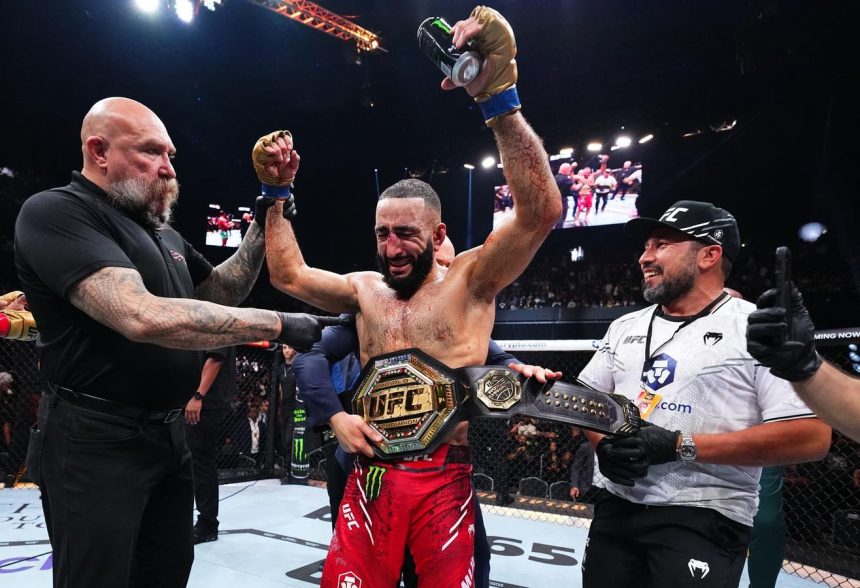Islam Makhachev, the reigning UFC lightweight champion, harbors ambitions of conquering a second weight class and becoming a two-division titleholder. His sights are set on the welterweight division, currently ruled by his friend and occasional training partner, Belal Muhammad. This potential clash presents a complex web of relationships and opinions, generating debate within the MMA community. Khabib Nurmagomedov, Makhachev’s coach and a legendary figure in the sport, vehemently opposes the idea of the two friends fighting, citing the emotional difficulty of preparing one to defeat the other.
The potential matchup was first discussed publicly during a conversation between Henry Cejudo, a former two-division UFC champion, and Nurmagomedov. Nurmagomedov expressed his discomfort with the prospect, emphasizing the close bond he shares with Muhammad and the emotional toll it would take to train Makhachev for such a fight. His reluctance stems from the personal connection rather than any doubt about Makhachev’s abilities. This adds a layer of emotional complexity to the narrative, contrasting the usual competitive drive with genuine affection and respect.
Former welterweight kingpin Kamaru Usman holds a contrasting perspective, advocating for the Makhachev-Muhammad clash. Usman, after witnessing Makhachev’s dominant title defense against Renato Moicano at UFC 311, believes that both Muhammad and featherweight champion Ilia Topuria present comparatively easier challenges for Makhachev compared to other welterweight contenders. He dismisses the notion of friendship preventing the fight, emphasizing the professional nature of the sport and the financial rewards at stake. Usman believes Makhachev has the potential to overcome both fighters. His stance suggests that business and competition should sometimes outweigh personal feelings in the pursuit of titles and career milestones.
Usman’s perspective goes beyond the immediate matchup. He believes Makhachev will struggle cutting to 155lbs. The former champ recommends a move up to 170lbs where Makhachev could capture his second UFC title. Usman’s belief is further rooted in his observation of Makhachev’s physique and perceived difficulty in making the lightweight limit, suggesting a move up to welterweight would be strategically advantageous. He uses his own experience as a former welterweight champion to lend weight to his argument, emphasizing the financial benefits of such a high-profile fight, even for the losing fighter. His pragmatic approach further contrasts with Nurmagomedov’s emotional response.
Muhammad, the current welterweight champion, swiftly and dismissively responded to Usman’s pronouncements, attributing them to Usman’s recent losing streak and diminished relevance. He criticized Usman’s current status as a “podcaster” and suggested that his three-fight losing skid warrants retirement considerations rather than offering opinions on other fighters’ careers. Muhammad’s sharp rebuke underscores the ongoing tension and competition between fighters, even outside of the octagon. He insinuated that Usman is clinging to relevance by commenting on active fighters and their potential matchups.
Muhammad further questioned Usman’s credibility by highlighting what he perceived as avoidance during Usman’s title reign. He argued that Usman conveniently overlooked him while he was on a winning streak and accused the former champion of ducking tougher opponents. This claim adds a layer of personal history to their back-and-forth, painting Usman as someone who avoids challenging matchups. By framing Usman’s comments as attempts to remain relevant, Muhammad effectively discredits his opinion and positions himself as the deserving and dominant champion.
The champion extended a conditional olive branch, suggesting he would consider a fight with Usman if the former champion could manage a victory against a ranked opponent. He specifically mentioned Joaquin Buckley, highlighting his recent impressive performance against Colby Covington. This conditional offer portrays Muhammad as confident in his own abilities while subtly challenging Usman to prove his worth before being considered a viable contender. This tactical move further diminishes Usman’s standing and reinforces Muhammad’s position of strength. It ultimately highlights the intricate dynamics of relationships, ambition, and competition within the UFC. The differing opinions and perspectives add intrigue to the potential matchup and contribute to the ongoing narrative within the sport.



